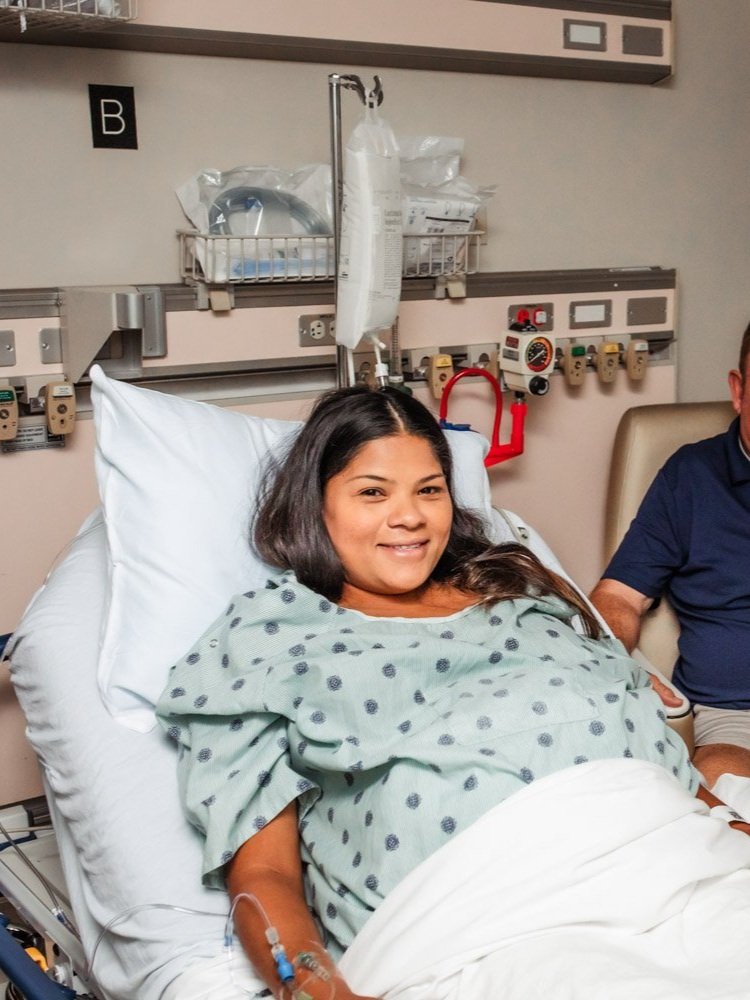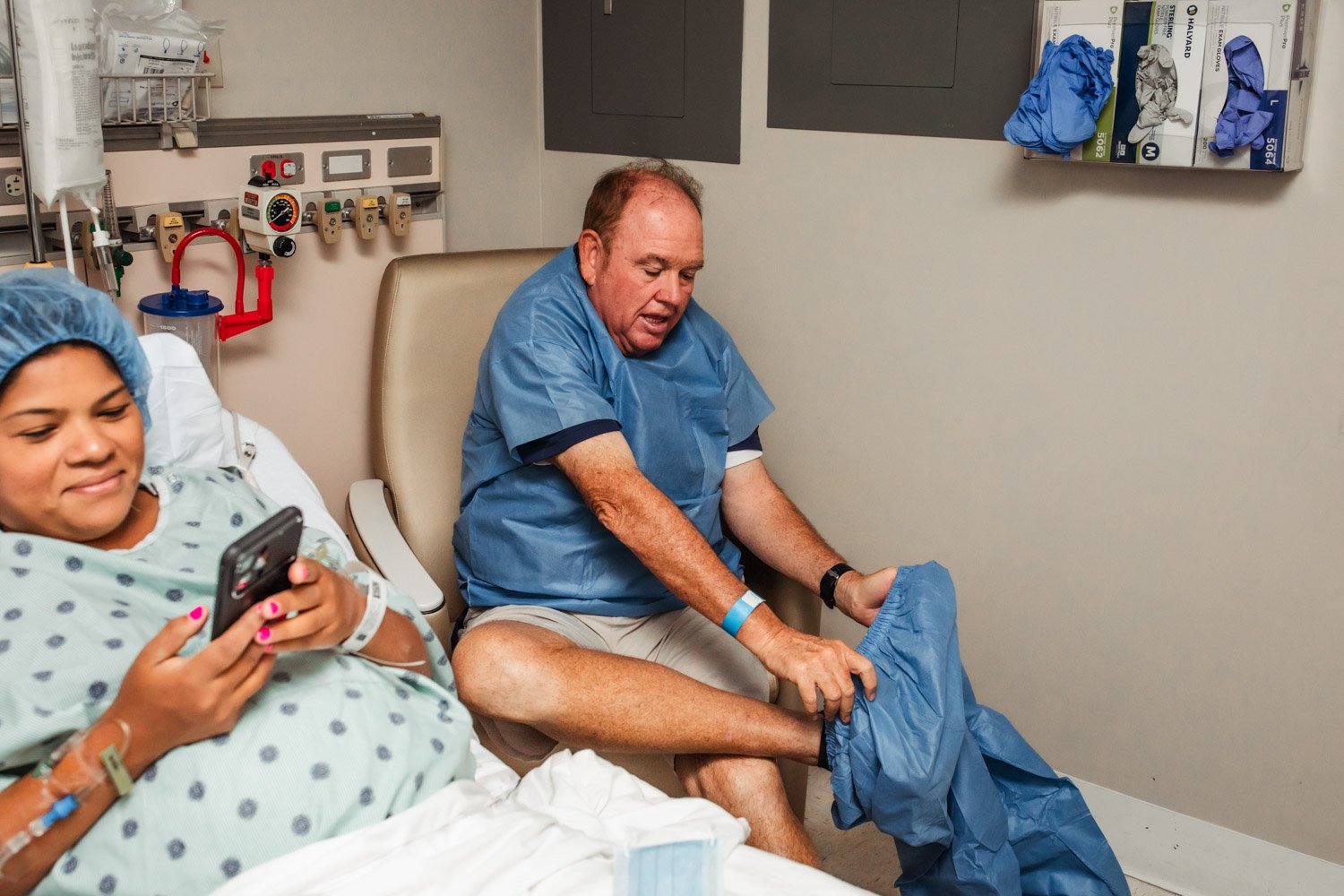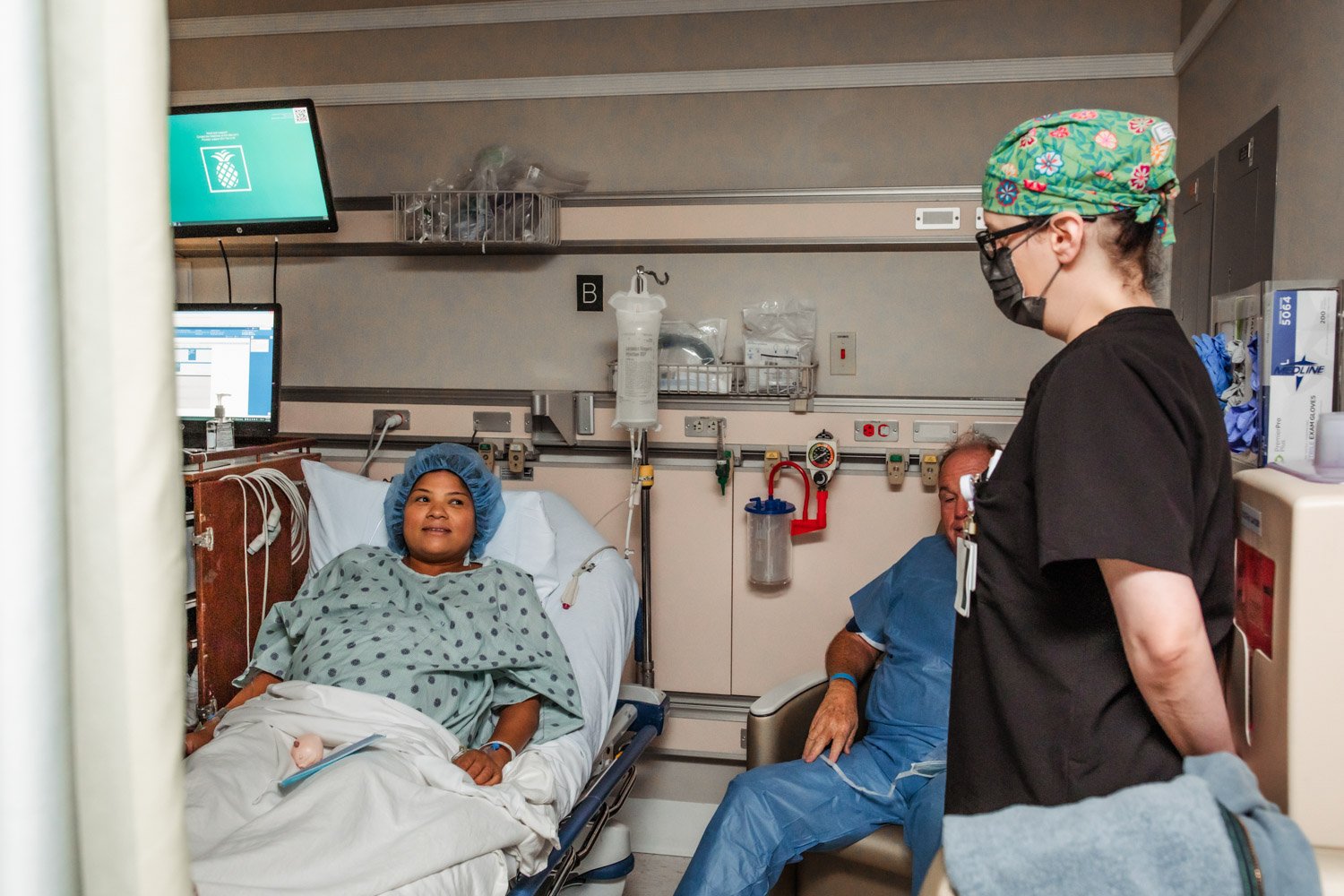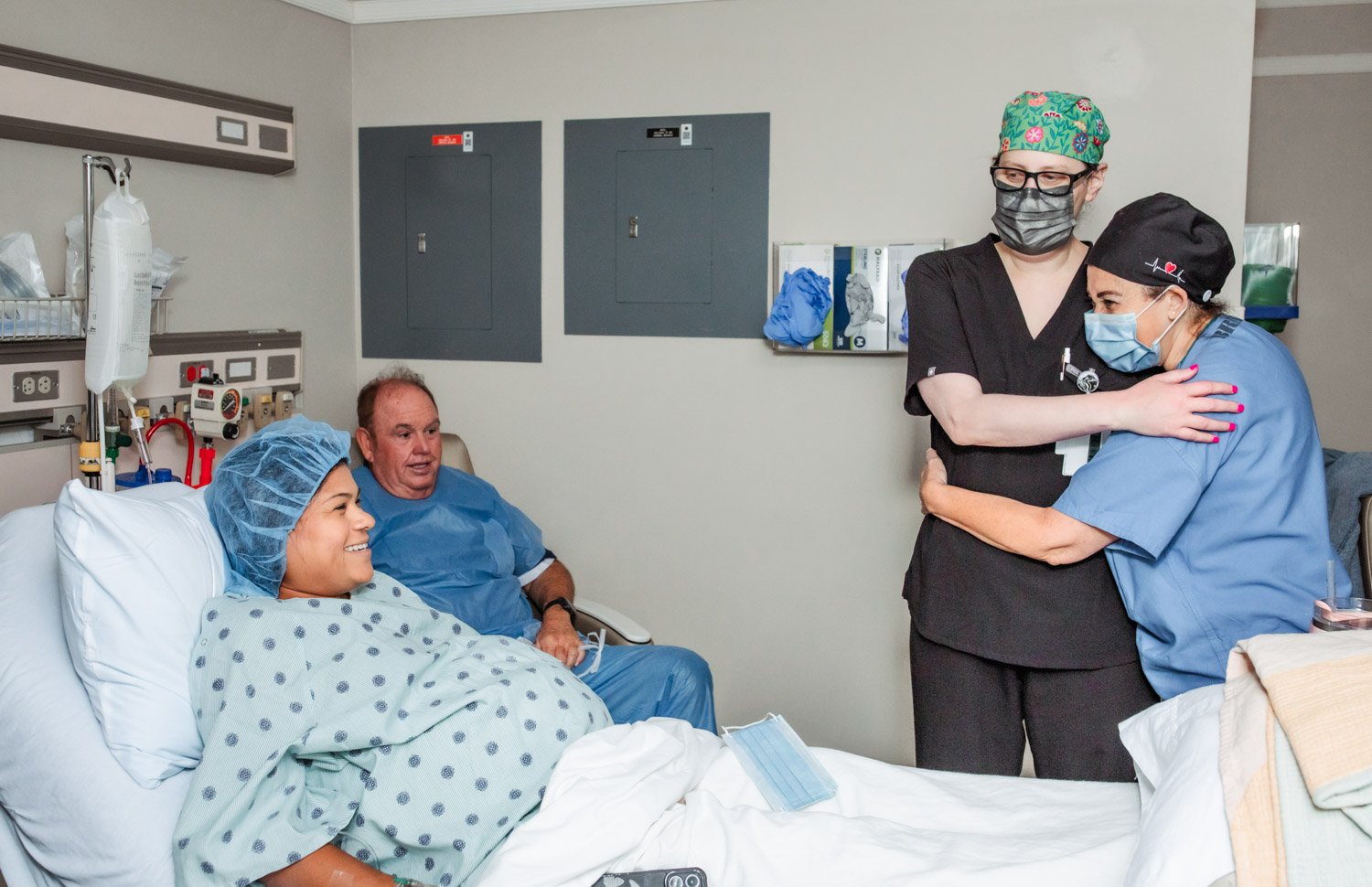This heartwarming collection of 48 birth photographs (from a full gallery of 107) chronicles the incredible journey of a cherished repeat client as she welcomed twins at Boca Raton Regional Hospital. With the skilled hands of OBGYN Dr. Dana Schey, the operating room transformed into a space of joy and anticipation. I've had the privilege of documenting this family's growth since their first child's birth in 2016, and capturing the arrival of their twins was truly an honor. Dr. Schey's expertise and compassionate care are evident in every image, showcasing the beauty and wonder of a twin delivery.
This birth story celebrates the miracle of life, the artistry of twin births, and the exceptional collaboration between the family's birth team, including Baptist Health Boca Raton Regional Hospital, Dr. Dana Schey, and myself, Boca Raton's dedicated birth photographer.
For those seeking a trusted OBGYN in Boca Raton:
Dr. Dana Schey is a highly experienced and respected obstetrics & gynecology specialist with over 20 years in the medical field. She's affiliated with both Boca Raton Regional Hospital and West Boca Medical Center, and her practice is currently accepting new patients.
Curious about the difference between a Spinal and an Epidural?
While this beautiful twin birth was made possible with a spinal block, many women opt for an epidural during vaginal deliveries. To learn more about these pain management options, check out this informative article:
What is the Difference between an Epidural and a Spinal?
Remember: Your OBGYN or Midwife is your primary source of information and support throughout your pregnancy. Don't hesitate to ask them any questions you may have!
Need Help Preparing for Your Prenatal Visits?
I've compiled a list of helpful questions to ask your OBGYN or Midwife during pregnancy. Feel free to print it out or keep it handy on your phone:
List of Questions to Ask your OBGYN/Midwife during pregnancy
Empowering yourself with knowledge is key to a confident and positive birth experience!
Charlie & Collin’s Birth Story
The night before we texted around 6pm. I tried to get to bed early, but you know how easily that goes when you are over the moon ecstatic that one of your Birth Photography clients is so excited to meet her babies the next morning! I am sure I got at least a couple of hours of sleep.
We agreed to meet in front of Labor and Delivery of Boca Regional Hospital at 4:45am the morning of July 19th.
We texted each other at 3:59AM on the morning of July 19th. Her sweet babies were going to be born on a Wednesday. We met up in front of the hospital at 4:36am knowing that the hospital instructed her with pre-op instructions to be at the hospital by 430am for her scheduled c-section delivery with her twins. 3 Hours Prior (which is excessive in my opinion as I have seen many of my c-section clients arrive 2 hours prior to their c-section and still have so much down time, while 3 hours ends up causing a lot of waiting, which builds a lot more anxiety).
I think it is typical upon arrival to feel a combination of things, a spectrum of emotions. We were all tired having started our days around 3AM in the morning and been up on our feet already two hours and the sun still hadn’t risen, but we were all really really excited.
Unfortunately, despite me arriving just before my Birth Photography client, I was not allowed to go upstairs at the same time as my client, as she was going to labor and delivery on the third floor. I understand initially they bring up patients to make sure they give them the opportunity to report any abuse (in relationships, I know this is shocking but its more common than you think and often this is a mom’s only opportunity) so I know I always have to wait for that. But shortly after she went upstairs to the third floor, her husband was able to come up, though I was kept waiting downstairs.
“They have me in the same little triage area” she texted me.
“There’s no available rooms, just FYI” she texted me.
A few weeks back, we had talked about what this c-section would mean to her. She experienced a previously traumatic delivery with her older daughter when she was in a car accident during her pregnancy and that kind of trauma tends to stay with you a long time. She didn’t feel great this pregnancy, as you can imagine how it goes with twins. She had some lower back period like cramping and tightening in the weeks leading up to her scheduled c-section, which is pretty typical.
Unfortunately despite her history, there weren’t any rooms available, so the pre-op area with the drawn curtains it is. Thankfully, it was not a busy morning, so her space was somewhat more on the private and quiet side.
After 30 minutes I started to get a bit worried. I knew how important it was to her to have my support and also how important it was to her that I capture every waking moment leading up to her babies being born.
Everyone thinks they know what Birth Photography is and they try to define it.
Some people think you start taking photos once the babies are delivered. Other people assume its a Newborn Shoot, you know, swaddled, posed babies. I myself have my own definition of what it is that I do as a Birth Photographer, and I know that at this point I should have already been with my client, but
the fact is, Birth Photography is what an expecting mom wants it to be.
It celebrates her love for her baby (or in this case babies) in the way a mother feels is true. If that starts before she sets foot into the hospital, that is when my job begins. In this case, it was causing me stress that I could not do my job because in this moment, no one had prioritized what the mom needed and planned for from the arrival at the hospital, which was to have me with her and her husband. She grasped her stress-ball tightly in her hand while she waited for me to finally be able to come upstairs.
I texted her “Does your nurse know your doula is here? Security told me they won’t let me up while you’re in triage, but I am not sure what’s going on. I also have your birth plan”
I sent that text to her at 552am.
Luckily, despite that scare, I was headed upstairs shortly after I was reunited with my client and she was relieved to see me.
Preparing to head into the Operating Room.
Mom was in a greenish traditional hospital gown that ties in the back, which she opted over a custom gown, (some of my families choose to not buy their own labor gown from amazon, though a majority enjoy the softer and more flattering fabric of the labor gowns on amazon), and dad was putting on the disposable scrub top, scrub pants and scrub booties prior to heading to the operating room at Boca Regional Hospital.
My Birth Photography client’s OBGYN Dr. Dana Schey arrived shortly after I did to chat and prep for her c-section surgery with her twins.
It was so comforting for my client to have her whole team there.
Walking to the Operating Room
Often, the scariest part of giving birth is the entire anticipation leading up to the actual delivery. This is often true for many moms, especially with regards to c-sections. Sure, there are exceptions and I have attended births where the scariest part isn’t always the anticipation. But for many moms, that is really the scariest part. Not knowing how things will go. Lots of medical stuff happening (noises, people, lots of blue everywhere), but thankfully, once they see and hear their baby, everything feels so much better!
But delivering twins can be a bit scarier sometimes. You’re worried two fold about two little babies! Will they be super small? How small will the twins really be? I’m not 40 weeks, but I am told 37 weeks is full term with twins. But still its two babies in there and my belly is still not that huge, how tiny will they be? Will baby B have a harder time than baby A? The list goes on indefinitely! The worries never end!
The clock on the wall above the scrub in station showed that it was 7:29am.
We had gotten there at 4:37am, it felt like a long day already and we hadn’t even met the babies yet!
Dad putting on his mask by the scrub station outside of the operating room
Dad watching through a window to the operating room as mom gets her spinal tap administered, her nurse is with her in the OR along with the anesthesiologist.
Dr. Dana Schey speaking with dad outside of the operating room at Boca Regional Hospital, going over the twin delivery, what he can expect to happen, including the Neonatologist checking on the babies and the possible involvement of the NICU (Neonatal Intensive Care Unit), before heading in for the c-section.
What does a Neonatologist do?
“A neonatologist is a healthcare provider who specializes in premature babies or newborns with high-risk or complex health conditions. If your baby is born premature or with an illness or congenital disability, a neonatologist will be the provider managing your baby's care.” [source: Cleveland Clinic]
For families investigating the best NICU facility in South Florida for their baby’s birth, it is important to research and ask questions, specifically by contacting the Director of labor and delivery at your preferred South Florida Labor and Delivery units and ask what level NICU their L&D has and what is the difference between an Level I and Level II NICU. According to the Boca Regional Hospital website, “The care given to our patients is exactly the same in both units and is provided by staff who are trained to the same standard and using the same equipment. The level III nursery provides some specialized technology and cares for babies born at fewer than 28 weeks gestation.” [source: Boca Regional Hospital website]
What is also really important to know about Boca Regional Hospital’s Labor and Delivery, that often I hear moms saying they will choose West Boca Medical Center because they have a Level III NICU and Boca Regional doesn’t is that
Nurses and Respiratory Therapists in the NICU at Baptist Health Boca Raton Regional Hospital NICU is trained to level III NICU.
[source: Boca Regional NICU link]
Additionally, other services provided in the Boca Regional Hospital NICU are:
SERVICES PROVIDED IN OUR NICU
Care of critically ill babies at or around 28 weeks or greater
Nurses and respiratory therapist trained to level III NICU
Doubled board-certified neonatologist in house 24 hours a day
Pharmacy, social work, physical and occupational therapy as well as nutritional services
Support groups and classes for parents
Breastfeeding support and equipment for sale or rental
Local sub-specialty support as needed
Participation in national research projects
I love the two bassinets waiting on the babies outside of the operating room! One for baby brother, one for baby sister.
Though I have always wanted to capture a photo of twins together in one bassinet, but many people don’t realize that a majority of time, one if not both babies may need to go into the NICU, even if for a short time, to receive extra medical support immediately following delivery, so it’s not often that I see both bassinets wheeled back into postpartum after the c-section delivery of twins.
The first thing dad did when he walked into the operating room was hold mom’s hand and that was just so heart warming to see & capture a photo of!
No matter how many babies you’ve given birth to, even if this isn’t your first or second c-section delivery, birth is intense! It’s not so easy to be calm & cheery in this moment as the surgery begins as one would think.
I captured the clock inside the operating room as well, but I am in disbelief that it was already 8:04am once dad and I joined mom in the operating room, before babies were even delivered! If you scroll up, you’ll see it was 7:29am when we were just waiting outside of the OR.
I was curious however, why there are always two clocks on the wall of the operating room in labor and delivery at Boca Raton Regional Hospital, so I had to do some research and found:
“Synchronized clocks and Elapsed Timers are commonly used in hospitals and other healthcare facilities. A synchronized clock system will assure accurate and uniform time throughout the facility. This allows all staff members to record time of events based on one accurate time source. These situations consist of (but are not limited to): Patient admission time, dispensing medicine, formal time of birth, length of an operation, a medical procedure and more. In addition to having a synchronized clock in places such as operating rooms, emergency rooms and medical procedure rooms, there is also a need for an elapsed timer. The elapsed timer can perform a count-up or countdown depending on the procedure. In order to provide a solution for monitoring or recording the accurate time as well as using an elapsed timer, Sapling recommends adopting the dual display solution. This solution includes one clock that will be dedicated to present the accurate time and a second clock that will be dedicated to act as the elapsed timer that would interface with the elapsed timer control panel. One way to implement this solution is to choose one analog clock dedicated to show the accurate time and the second display is a digital clock dedicated to act as the elapsed timer.” [source: sapling-inc.com]
A lot of nerves and anxiety leading up to the babies deliveries. As you can see, it’s not only affecting mom, but also dad. Which is why other hospitals must do better. Doula support is not only for the birthing parent — the other parent often needs just as much support through this process, yet there is rarely anyone who is able to fill this role.
The sooner every hospital recognizes that cesarean birth is the only awake major surgery that should allow for experienced support people to attend, the better the birthing community & their patients will be served.
Baby A - Feet First
As seen here, Baby A - often referred to as the first twin being delivered, is being delivered feet first. I’ve seen this referred to as “footling breech” at previous deliveries. Though to be frank, I am not sure if this was baby’s gestational position leading up to delivery - I hadn’t asked my client before. I’ll have to check in with her and update.
“Twins are labeled as A or B according to their location relative to the birth canal. Antenatal labeling is usually established by prenatal ultrasound. Most often, fetuses known in utero as twin A are also first born and thus retain their label. [source]”
Sometimes with twins, they are scooped off to be seen by the Neonatologist before mom and dad get to have a good look at them at the moment of delivery
Baby B - Feet First
If you look closely, you can see a pair of teeny tiny feet of Baby B also emerging first.
Scooped away by Neonatology to ensure babies are safe
Baby B is weighed - 5 pounds 4 ounces
Baby A is weighed
Baby A weighed 5 pounds and 1 oz — really good weights for both twins!
Dad being guided over to the baby warmer to meet the babies — first Baby A! (the closest baby warmer in the operating room to mama)
Dad went back to mom to express his excitement for being able to see Baby A up close!
You can also see OBGYN Dr. Dana Schey peeking over the blue drape in the above image, she was so excited for her patient and her patient’s husband!
At this moment, a lot of the nerves and anxiety of “will they be okay” have passed, and the parents are able to catch a breath knowing their babies are both safe & in good hands
We were caught off guard when the nurse suddenly brought Baby A over to meet mommy! I love that the nurse left the “A” on the baby’s swaddle so we would know exactly who mama is meeting in the photos later!
Though the babies both have their unique identifying features and it is easy to tell that this is Baby A - baby girl Charlie!
Baby’s First Kiss
Just the sweetest moment. C-section deliveries indeed are a medical procedure, but they also are the powerful process & journey of birth, and I am so thankful for the medical staff that understand how very important to the parents mental health and to mommy-baby bonding it is to have this brief meeting moment happen IN the operating room
Mama still had her stress ball, and this is such a good idea — I have not seen this done before and highly recommend it. It is so nice to feel that comfort through this whole process
In the background of this image, across the operating room, you can see the nurse doing Baby B’s footprints
Meeting Twin B
Showing Mommy all that hair!!
Smooches for Baby B!!!
“It's important to know that multiples have a much higher rate of prematurity than singletons. And with premature labor comes the risk that your babies won't be fully developed – which means they will need special care in the NICU (neonatal intensive care unit) before they can go home.” [source:thebump]
“How long they stay in the NICU (neonatal intensive care unit) will depend on a number of factors, including gestation at delivery, weight, any complications that have occurred, and the overall health of the babies. But try not to be too overwhelmed by the NICU – it’s just a place for your babies to receive extra special care. The best thing you can do is plan ahead to find the highest level NICU in your region, in the event that your babies do need to spend time there.” [source: thebump]
Immediately following delivery, the hospital medical staff guided dad to the NICU to see and be near his babies, while mom recovered (as obviously unable to walk or be in a wheelchair immediately following the surgery)
Baby A (girl) “Charlie” was given a pink blanket with froggies
Baby B (boy) “Collin” was given a blanket with puppies
I think it is so sweet & cute that the patches on the baby’s skin have little blue hearts on them.
These patches are used to continuously record baby’s vitals (“through electrodes placed on the skin with wires attached to monitoring platforms. Researchers are working to replace the wires with a patch that would allow parents to hold their little one while [he or she is] being monitored.” [source: medicaldesignbriefs]
You can see just how small baby is next to daddy’s hand!
I love the fact that this hospital does a keepsake blue baby footprint book for every baby — I had my daughter over a decade ago at this same hospital and have my own blue book.
Updates on babies & mama after delivery:
Already later that afternoon, mama updated me that both of the twins went to oxygen level 2, then down to 1, and by evening were completely off oxygen all together.
Charlie (Baby A - girl) was already practicing with a bottle that same night of her birth.
By three days after birth, all IVs and feeding tubes were out for both babies and mom and dad were able to feed both babies without all the wires and tubes.
Big sisters were able to come to the hospital on day 3 to look at the twins through the nursery window (still no touching or holding but so nice for them to finally see their baby siblings).
Baby A (Charlie - girl) had increasing jaundice levels on day 3 so she had to go under special lights after her 11am feed, though the hospital said it was looking good for the babies to both go home on day 4, as the medical staff inspected mom and dad’s car to ensure their car seats were according to regulations.
Mama was discharged from the hospital 4 days after her delivery.
Another update 11 days after birth came in from mama that her pain and discomfort from the surgery continued about 9 days after birth, and came back on day 11.
Babies were still not sucking as well as they were hoping for and so mama was pumping as much as possible to keep up with them once they are able to suck, though both have a great latch and the family’s pediatrician said it can take them until past 37 weeks to really acquire that skill.
Overall sleepless nights, but they are giving mom and dad 3 hours of good sleep in between feedings and they were able to keep up with the NICU schedule.
It has now been 6 months since the babies were born, I hope to be able to see them and their big sisters hopefully sometime this year in 2024! I love my Birth Photography families!! I am so grateful for Dr. Dana Schey taking such good care of my clients and trusting me to be part of my clients birth teams in the delivery room and operating room. Thank you so much Dr. Dana Schey!









































































